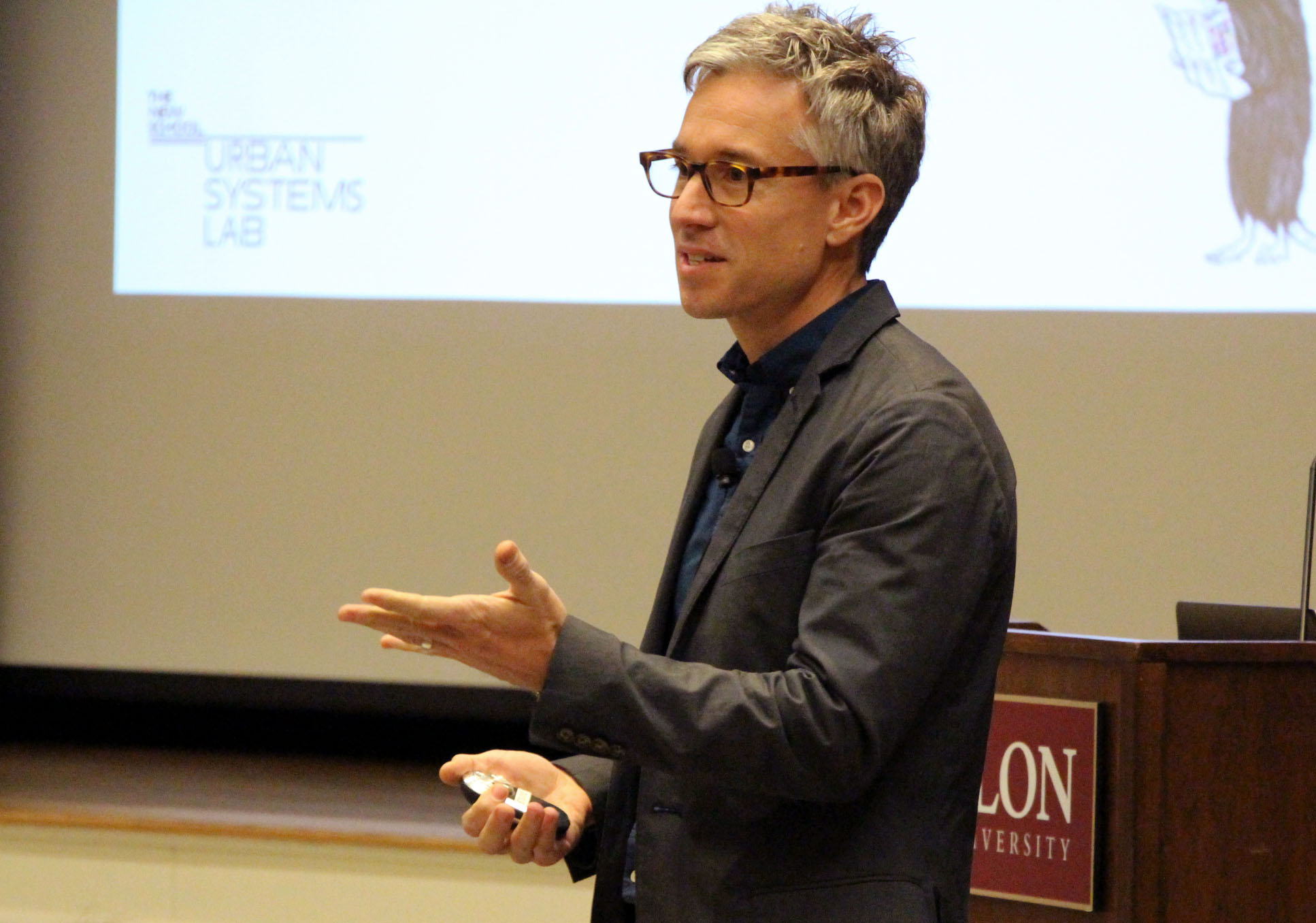Timon McPhearson's lecture, "Urban Futures: Transforming Cities for Resilience and Sustainability," was presented by Elon College, the College of Arts & Sciences as part of the annual Voices of Discovery series.
Timon McPhearson led with the bad news at Monday’s Voices of Discovery lecture: Conservative and optimistic scientific models now show the earth warming 3 degrees Celsius by 2100.
Scientists previously anticipated and warned against the catastrophes a 2-degree change would bring through rising sea levels, extinctions and natural disasters of increasing frequency. The Paris Climate Accord, which the U.S. formally disengaged from Tuesday, seeks to hold the increase to 1.5 degrees.
An increasingly hot planet means trouble particularly for the urban areas that McPhearson intensely studies as associate professor of urban ecology at the New School and New York director of the Urban Systems Lab. More severe and frequent flooding is likely to occur. In New York City, data suggest, the 90-degree days now seen as a heat wave in the Big Apple will be the average summer day in 2080.
“I’m not saying this necessarily to scare you,” McPhearson told several hundred gathered in McKinnon Hall. “It’s to say that if we want to think about adapting to a changing climate future, what are we actually building for? How high do our sea walls need to be? What is the heat future we need to prepare for to figure out how to better cool our cities? If we’re not having a realistic conversation about (what the future is going to be like), it makes it very difficult to plan for.”

So where’s the good, or at least the not-so-scary, news?
Science is improving, and we have more data – and more ways to gather it and use it – than ever before.
New ways of measuring urban heat, flood plains, susceptibility and resiliency to various extreme-weather scenarios are precise enough to focus on specific buildings and parcels in an area. McPherson showed a series of maps detailing buildings and blocks in New York lit up in different colors based on temperature, demographics and access to services and amenities.
“This kind of information is changing the ability of how we can plan better to target our resources to have the most effect,” McPhearson said. “Which streets under what scenarios are going to be the hottest? Where should we plant trees? We can tell you that now.”
Science is making urban planning more effective. That means greater resiliency for residents of the future and greater sustainability of systems in place. McPhearson is a pioneer in urban ecology, the study of life in environments designed by or for humans, or directly impacted by human-centric environments.
One of the aspects McPhearson is most concerned with is that plans for urban sustainability and resiliency don’t exclude or harm minority or poorer neighborhoods.
In New York, heat is already the largest weather-related killer. Most of the current and projected highest temperatures are in areas of Brooklyn, the Bronx and Harlem – also areas of historically minority and poorer populations.
“In a number of places, what we’re going to be doing to protect or reinforce critical or high-value infrastructure is going to reinforce the status quo … of long-term structural racism and social inequities that are pretty much the hallmark of the nature of cities we have,” McPhearson said. “How do we protect these vulnerable populations that are at risk again and again?
Site-specific urban planning, he reiterated, and city-wide, regional conversations about adaptations to infrastructure and urban life.
McPhearson closed the hour-long lecture by urging against dystopian visions of the future.
“How do we shift our trajectory? We need to have a positive vision,” he said. “News is dominated by this dystopian narrative of our future. … There’s no way we’re going to get to a 2050 that’s better or a 2080 that’s better if we don’t have something positive to plan for.

“For example: We can look at nature-based solutions, ecological solutions in cities. We can look at how to scale those, plan those and leverage those to achieve a better future.”
—
The Voices of Discovery series is produced by Elon College, the College of Arts and Sciences to bring preeminent scientists and mathematicians to Elon University to share groundbreaking research and perspectives with students and the community.
Future Voices of Discovery lectures include:
Andrea Grimes Parker, “Transforming the Health of Communities through Innovations in Social Computing,” 7 p.m. March 9 in McCrary Theatre; and
Scott L. Delp, “Harnessing Big Data to Optimize Human Movement and Health,” 7 p.m. April 6 in McCrary Theatre.



